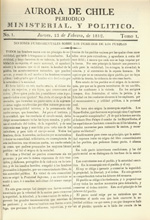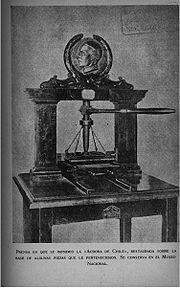
La Aurora de Chile
Encyclopedia

Chile
Chile ,officially the Republic of Chile , is a country in South America occupying a long, narrow coastal strip between the Andes mountains to the east and the Pacific Ocean to the west. It borders Peru to the north, Bolivia to the northeast, Argentina to the east, and the Drake Passage in the far...
an history and mostly dealt with politics and political philosophy
Political philosophy
Political philosophy is the study of such topics as liberty, justice, property, rights, law, and the enforcement of a legal code by authority: what they are, why they are needed, what, if anything, makes a government legitimate, what rights and freedoms it should protect and why, what form it...
. It was in print from February 13, 1812 to April 1, 1813, at which point it became El Monitor Araucano. The paper had four printed pages with two columns each, and was published weekly, every Thursday.
Background

Lima
Lima is the capital and the largest city of Peru. It is located in the valleys of the Chillón, Rímac and Lurín rivers, in the central part of the country, on a desert coast overlooking the Pacific Ocean. Together with the seaport of Callao, it forms a contiguous urban area known as the Lima...
, Buenos Aires
Buenos Aires
Buenos Aires is the capital and largest city of Argentina, and the second-largest metropolitan area in South America, after São Paulo. It is located on the western shore of the estuary of the Río de la Plata, on the southeastern coast of the South American continent...
, and Spain
Spain
Spain , officially the Kingdom of Spain languages]] under the European Charter for Regional or Minority Languages. In each of these, Spain's official name is as follows:;;;;;;), is a country and member state of the European Union located in southwestern Europe on the Iberian Peninsula...
, and they only arrived in Chile after a considerable delay. The Enlightenment's political philosophy and the political documents and pamphlets of the revolutions in the United States
American Revolution
The American Revolution was the political upheaval during the last half of the 18th century in which thirteen colonies in North America joined together to break free from the British Empire, combining to become the United States of America...
and France
French Revolution
The French Revolution , sometimes distinguished as the 'Great French Revolution' , was a period of radical social and political upheaval in France and Europe. The absolute monarchy that had ruled France for centuries collapsed in three years...
were known in Chile and had been translated. However, while there may have been a printing press operated by the Spanish Jesuits for printing religious material in the decades prior to 1810, there was no native press reprinting the philosophy from abroad, or printing Chilean revolutionary material, until the arrival of the first native printing press
Printing press
A printing press is a device for applying pressure to an inked surface resting upon a print medium , thereby transferring the ink...
in Chile in 1811.
However, after the successful rise to power of the first revolutionary Government Junta on September 18, 1810, the government, in the words of Hernández, "instinctively felt the need, if we may say so, for close contact with public opinion, which had not, in order to express itself, had any of the means with which we are familiar today." Locals in Chile had attempted to procure a printing press from the Spanish government and then under the Junta, attempts were made to purchase a printing press from the revolutionary junta
Military dictatorship
A military dictatorship is a form of government where in the political power resides with the military. It is similar but not identical to a stratocracy, a state ruled directly by the military....
in Buenos Aires, but were unsuccessful. Finally, on November 24, 1811, Swedish-American Mathew Hoevel , an idealist for free government, landed the Galloway in the port of Valparaiso
Valparaíso
Valparaíso is a city and commune of Chile, center of its third largest conurbation and one of the country's most important seaports and an increasing cultural center in the Southwest Pacific hemisphere. The city is the capital of the Valparaíso Province and the Valparaíso Region...
with a printing press, American printers, and arms and munitions to supply the troops of the independence movement. These printers, who included Samuel Burr Johnston, soon set to work publishing the Aurora de Chile, Chile's first local publication.
The Aurora in circulation
The paper's first issue was published on February 13, 1812 under the direction of Camilo Henríquez GonzálezCamilo Henríquez
Friar José Camilo Henríquez González was a priest, author, politician, and is considered an intellectual antecedent to and founding father of the Republic of Chile for his passionate leadership and influential writings...
, who was not only the first editor of Chile's first periodical, but also the first that had seriously argued for Chilean independence. It was the first widespread publication to introduce its readers in Chile to the Enlightenment philosophies—Rousseau, Voltaire, and others—which informed Henríquez's writings. In writings authored by Manuel de Salas, Juan Egaña, Manuel José Gandarillas, and the Guatemala
Guatemala
Guatemala is a country in Central America bordered by Mexico to the north and west, the Pacific Ocean to the southwest, Belize to the northeast, the Caribbean to the east, and Honduras and El Salvador to the southeast...
n Antonio José de Irisarri
Antonio José de Irisarri
Antonio José de Irisarri Alonso , was a Guatemalan statesman, journalist and Interim Supreme Director of Chile . He is considered one of the fathers of Chilean journalism together with Fr. Camilo Henríquez....
, the Aurora de Chile gave expression to the principles of popular sovereignty
Popular sovereignty
Popular sovereignty or the sovereignty of the people is the political principle that the legitimacy of the state is created and sustained by the will or consent of its people, who are the source of all political power. It is closely associated with Republicanism and the social contract...
, self-governance
Self-governance
Self-governance is an abstract concept that refers to several scales of organization.It may refer to personal conduct or family units but more commonly refers to larger scale activities, i.e., professions, industry bodies, religions and political units , up to and including autonomous regions and...
and election of officials, separation of powers
Separation of powers
The separation of powers, often imprecisely used interchangeably with the trias politica principle, is a model for the governance of a state. The model was first developed in ancient Greece and came into widespread use by the Roman Republic as part of the unmodified Constitution of the Roman Republic...
. The paper was also the vehicle for the sharp wit and timely commentaries by Camilo Henríquez on the happenings of the monarchy. The American influence was a major factor for Chile's liberal revolutionary intelligentsia, and the Aurora republished speeches by Washington, Jefferson, Madison, and other American revolutionaries, who became heroes in the Chilean press.
On April 1, 1813, the paper was transformed into El Monitor Araucano.

